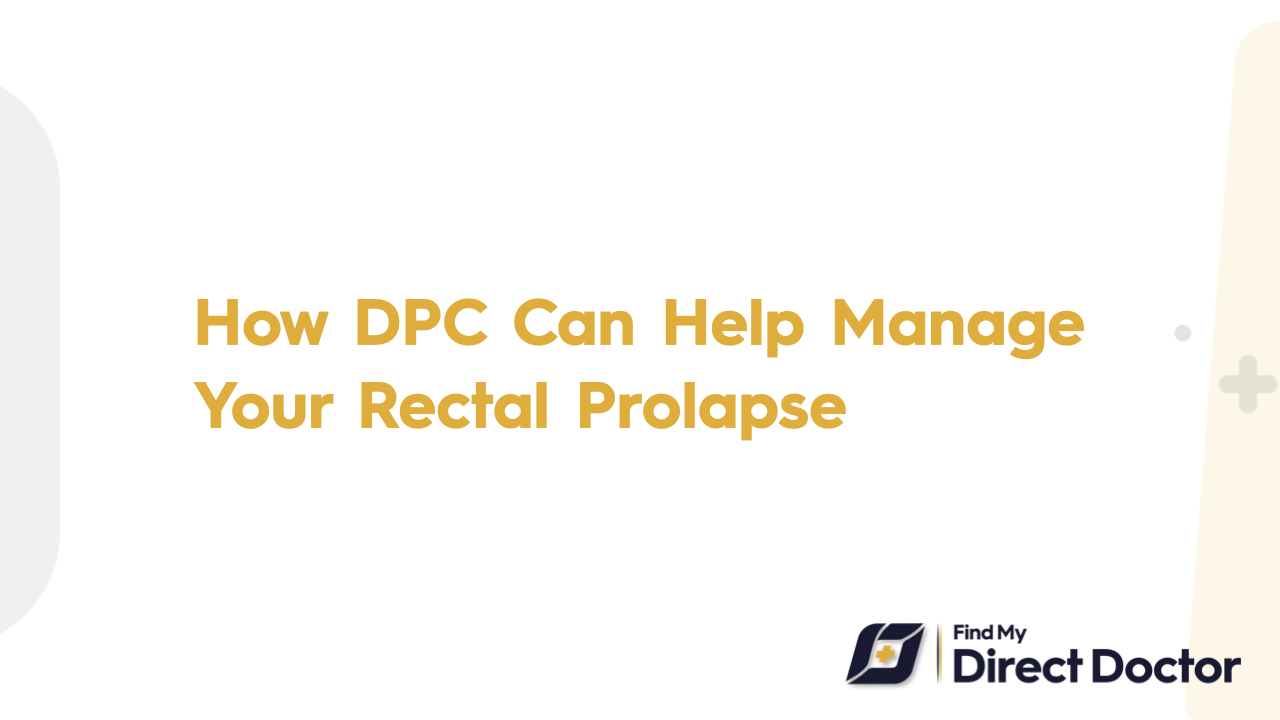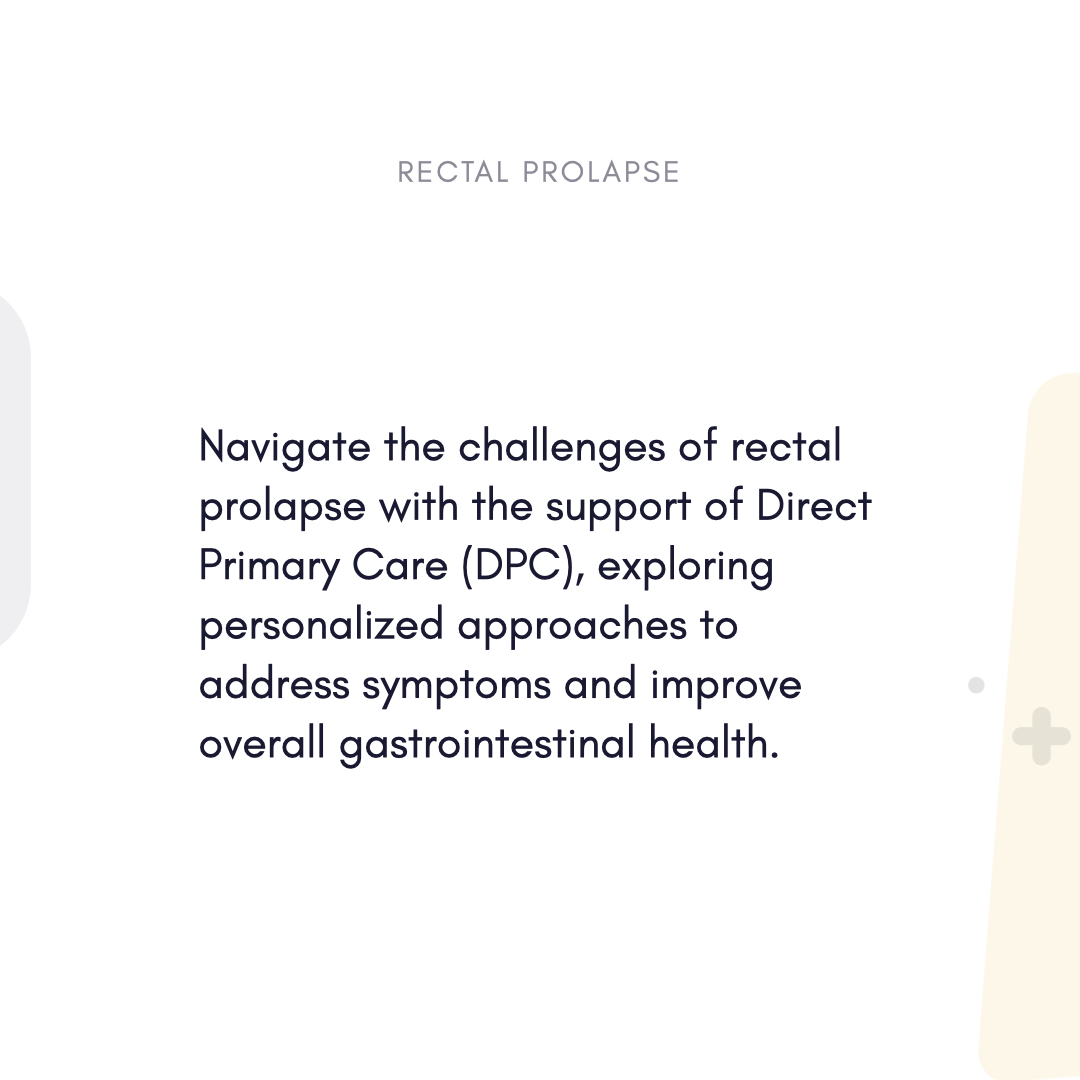Rectal Prolapse and Direct Primary Care (DPC): Compassionate Care for Sensitive Health Issues
A pain or bulge experienced during bowel motions. The humiliation keeping you from getting help. For 1 in 100 adults with rectal prolapse, this pelvic floor condition is emotionally isolating rather than only physically unpleasant. Although conventional treatment sometimes delays specialist referrals or rushes through tests, there is hope: Direct Primary Care (DPC) offers a safe, patient-centered approach to restore dignity and function.

Awareness of Rectal Prolapse
Rectal prolapse is the condition in which rectal tissue rises through the anus usually resulting from:
- Straining or persistent constipation
- Post-childbirth, aging, weakness of the pelvic floor
- Neurological disorders including spinal damage and MS
Symptoms consist in:
- Clear rectal protrusion
- Mucus discharge, or fecal incontinence
- Rectal bleeding or discomfort
Untreated risks: Ulceration, stranding, sepsis The American Society of of Colon and Rectal Surgeons advises quick assessment to decide on surgical rather than conservative treatment.
DPC Changes How Rectal Prolapse Maintenance
Operating on a membership model usually ranging from 100 USD to 200 USD per month, Direct Primary Care (DPC) provides unlimited access to your doctor for a set fee. For prolapse patients, this means no co-pays, no hurried tests, and a care plan as considerate as your needs.
1. Discreet diagnosis and instant relief
DPC's approach guarantees:
- Same-day assessments in private, free of judgment environments.
- Exams in-office: prolapse grading and digital rectal exams.
- First interventions: topical oestrogen creams, stool softeners.
2. Individualized, Guideline-Driven Treatment
DPC doctors design custom plans compliant with ASCRS recommendations:
- Pessaries, biofeedback, pelvic floor PT under conservative management.
- Surgical coordination: Referrals for Delorme's operation or laparoscopic rectopexy.
- Fiber supplements, laxatives, enema techniques help to optimize bowel programs.
3. Complete, Economical Assistance
DPC helps to lower emotional and financial burden by:
- Wholesale pricing for docusate or linaclotide helps to slash medication costs.
- 24/7 telehealth access is Handling post-operative issues or incontinence.
- Counseling for anxiety/depression connected to prolapse is part of mental health integration.
DPC's advantages for rectal prolapse sufferers
1. Inappropriate Accessibility
- 24-hour consultations for pain or sudden prolapse incarceration.
- No waiting for referrals for colorectal surgeons.
2. Customized Interventions
- Early PT to build pelvic floor muscles helps with postpartum prolapse.
- Older patients can choose non-surgical solutions including perineal support devices.
3. Open Cost Transparency
- Membership consists in consultations, tests, and coordination of care—no hidden costs.
- Typical savings of 5,000 USD+ by avoiding ER visits and surgery facility fees.
Personal Success Stories from Real Life
- Case 1: Maria, 65, avoided surgery with DPC's pelvic PT and bowel program. From Grade III to Grade I, prolapse dropped.
- Case 2: John, 45, had DPC-arranged laparoscopic rectopexy for a spinal injury-related prolapse. Six weeks will see complete recovery.
Ask questions about DPC and rectal prolapse.
- Q: Can DPC manage emergency prolapse strangulation?
- A: Surely. DPC physicians oversee post-operative care and schedule same-day surgeries.
- Q: Is DPC within reach for those without insurance requiring surgery?
- A: Sure. Members get cash-pay discounts, say 8,000 USD instead of 30,000 USD for a rectopexy.
- Q: Regarding pelvic floor treatment, what?
- A: A DPC negotiates 60 USD/session cash rates by working with specialized PTs.
Why DPC Benefits Those Affected by Prolapse
Emphasizing DPC's alignment with pelvic health criteria, the International Urogynecological Association supports:
- Precision: Customizing treatment to patient goals and prolapse degree.
- Empowerment: Instruction in preventive measures and hand reduction techniques.
- Trust: A caring team replaces disjointed, embarrassing treatment.
Get Confidence and Comfort once more.
Rectal prolapse need not control your life. DPC helps you heal—with dignity and discretion—by means of a partner who listens carefully, coordinates skillfully, and supports you.






